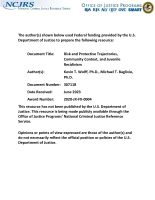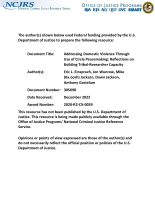Community justice
Forensic Technology Center of Excellence, Fiscal Year 2021
Implementation of NPS Discovery – An Early Warning Systems for Novel Drug Intelligence, Surveillance, Monitoring, Response, and Forecasting using Drug Materials and Toxicology Populations in the US
Positive Adolescent Interpersonal Relationships (PAIR): A Community-Based STRiV Study
Criminal Justice Technology Testing and Evaluation Center
NIJ FY23 Center for Enhancing Research Capacity (CERC) at Minority Serving Institutions (MSIs)
Risk and Protective Trajectories, Community Context, and Juvenile Recidivism
Verification Report, Toolkit for Selective Analyses & Reconstruction of Files (FileTSAR)
Addressing Domestic Violence Through Use of Circle Peacemaking: Reflections on Building Tribal-Researcher Capacity
Desistance from Crime: Interventions to Help Promote Desistance and Reduce Recidivism
No single criminal justice agency can promote desistance on its own. Partnerships across state, local, and federal agencies — along with the support of family and community stakeholders — are instrumental in supporting desistance from crime and reducing recidivism.
Law enforcement, courts, corrections, and community supervision agencies play a key role in the desistance process and reducing recidivism.
See the YouTube Terms of Service and Google Privacy Policy




